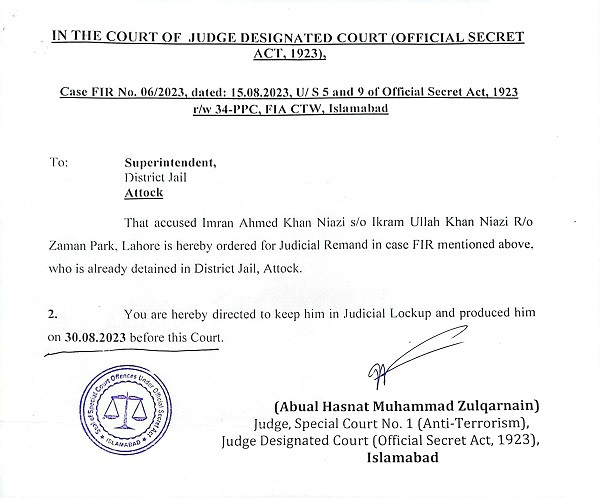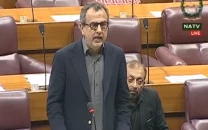Imran unable to walk free despite IHC relief
Bench suspends sentence in Toshakhana case, orders release on Rs100,000 bail
1683888120-0/image-(3)1683888120-0-640x480.webp)
The Islamabad High Court (IHC) suspended on Tuesday the sentence awarded to Pakistan Tehreek-e-Insaf (PTI) Chairman Imran Khan in the Toshakhana case and ordered his release on bail, but the former prime minister still remained behind bars as a judge had already ordered his detention in another case.
Khan has been imprisoned in the Attock District Jail since August 5 after being sentenced by an additional district and sessions judge (ADSJ) of Islamabad to three years jail and Rs100,000 fine. Imran had challenged the ADSJ’s decision in the IHC.
"We feel that the applicant is entitled to the suspension of sentence and be released on bail," said a two-member IHC bench, led by Chief Justice Aamer Farooq and including Justice Tariq Mehmood Jahangiri. The bench ordered Imran’s release on bail against the surety bond of Rs100,000.
In its eight-page judgment, the bench said that the three-year imprisonment and Rs100,000 fine awarded by the trial court was of a short duration, therefore, the sentence had been suspended, adding that the PTI chairman should be released on bail.
 Imran’s lawyers, Babar Awan, Barrister Gohar Ali Khan, Sher Afzal Marwat and others were present in the court when the decision was announced. Imran’s sisters Alima Khanum and Uzma Khan were also present in the courtroom.
Imran’s lawyers, Babar Awan, Barrister Gohar Ali Khan, Sher Afzal Marwat and others were present in the court when the decision was announced. Imran’s sisters Alima Khanum and Uzma Khan were also present in the courtroom.
The judgment also referred to the Qaim Ali Shah case, saying that the Supreme Court has held that it was not necessary to suspend the sentence in every case, rather it was the discretion of the high court to grant or deny bail.
The judgment also mentioned the Supreme Court’s ruling on the National Accountability Bureau’s (NAB) appeal against the suspension of sentence of former prime minister Nawaz Sharif in the Avenfield reference case.
Read: Legal snags hit PTI chief’s release prospects
The judgment made it clear that other issues under consideration were not being determined in the sentence suspension application, adding that the parties had given detailed arguments on these issues, but those would be determined in the appeal.
Lawyers said that the conviction from the ADSJ’s court had also disqualified the former prime minister from contesting the elections for five years, adding that despite the suspension of the sentence, Imran could not contest the elections as long as the conviction stood.
Later in the day, the surety bonds for Imran’s release were not filed within the court timings, therefore, his release order could not be issued. According to Barrister Gohar, the bail bonds would be submitted on Wednesday (today), after which the release order would be issued.
On August 5, Imran was awarded three-year jail term and Rs100,000 fine by then ADSJ Humayun Dilawar, for concealing Toshakhana gifts he had retained, on a complaint filed by the Election Commission of Pakistan (ECP).
While in jail, the PTI chairman was arrested by the Federal Investigation Agency’s (FIA) Counter-Terrorism Wing (CTW) in the case of missing cipher, filed under the Official Secrets Act. Besides, his bail was cancelled in the cases relating to the May 9 violence and attacks on military installations.
In order to ensure his release, Imran’s legal team moved the IHC, requesting the court to restrain the FIA, NAB and the police from arresting him in any other case. The petition was submitted on behalf of the PTI chief by his lawyer Suleman Safdar on Wednesday.
State secrets
In the state secrets matter, the FIA said the former premier had been charged with making public the contents of a confidential diplomatic cable and using it for political gains. Imran had alleged that the cable proved a foreign conspiracy behind his removal from the government in April 2022.
A special court established to try the case under the Official Secrets Act, 1923, ordered the Attock Jail superintendent to keep Imran in "judicial lockup and produce him on 30.08.2023 before this court". Imran’s number 2 in the PTI, Shah Mahmood Qureshi, has already been arrested in the same case.
Imran’s supporters termed his continued incarceration a "manipulation of justice". His lawyers said he was granted bail and they were initially hopeful he would be released from Attock Jail. However, they added, he remained in detention because of a previous arrest, made in secret.
"He was arrested prior to today's court ruling. The exact date of his arrest remains unclear," Barrister Gohar told AFP. "His legal team was intentionally left uninformed and kept in the dark [about the arrest]", added another lawyer, Shoaib Shaheen,. "This constitutes a manipulation of justice."
One of his lawyers told reporters outside the Attock Jail – which was surrounded by patrolling police units – that Imran was "on judicial remand" and would appear before a special court in Islamabad on Wednesday (today).
(WITH ADDITIONAL INPUT FROM SALEH MUGHAL & AGENCIES)
Earlier hearing
When the IHC bench resumed hearing the case on Monday, ECP’s counsel Amjad Pervaiz presented detailed arguments responding to the points raised by Imran’s lead counsel Latif Khosa.
At the first hearing of the case on August 25, Khosa had argued that Imran’s sentence should be suspended in view of an unauthorized filing of a complaint by the ECP; lack of jurisdiction; the fact that Imran was sentenced to only three years in prison; that the trial court deprived him of the right of defence and that it delivered the order without hearing arguments about the complaint’s maintainability.
While presenting arguments as to why it was necessary for the court also to issue notices to the state of Pakistan as a respondent in the case, Pervaiz contended that there was nothing wrong with the way the ECP filed a complaint against Imran at a district and sessions court.
The chief justice, however, noted that the ECP ordered its office to file a complaint and not the ECP secretary who can be authorized as per law to file such criminal complaints in courts. “Could anyone else besides the secretary file a complaint? Could the ECP 's DG also file this complaint?" he asked.
The counsel replied that the ECP secretary is the administrative head of the office.
Justice Farooq noted that administrative matters of the high court and Supreme Court are handled by their registrars. "Will a chief justice ask the registrar to take an action or the office, or both?" The lawyer said both the registrar and the office can be instructed to take action.
Rejecting Khosa’s argument that the ECP’s complaint should have been heard by a judicial magistrate first, the ECP’s counsel said in the past 50 years, no complaints regarding corruption and corrupt practices have been submitted to any magistrate.
“The magistrate does not even have the authority to issue orders on a complaint regarding corrupt practices, let alone having the power to pass orders on any complaint. The magistrate can only issue orders on complaints falling under their jurisdiction.”
To Khosa’s argument that Imran’s sentence should be suspended in view of its relative brevity, Pervaiz referred to a recent decision of an Indian court in the Rahul Gandhi case.
Imran’s counsel had contended that the trial court had deprived the PTI chief to present witnesses in his support but Pervaiz argued that Imran had submitted a list of irrelevant witnesses in the court. “This is a case of submitting false declarations of assets and liabilities and not a case of tax evasion,” he said.
PTI chief’s counsel on August 25 contended that on the morning of August 5, some people tried to abduct a clerk of Imran’s former lead counsel Khawaja Haris and that was the reason why he had failed to appear in the trial court on time.
“Khawaja Haris wrote to the chief justice of the Supreme Court and informed him about the matter. At 12 o'clock, Khawaja Sahib arrived at the trial court. However, the judge told him that now his presence was not required.
“At 12:30, the judge, in a brief order, pronounced a three-year sentence. At 12:35, it was discovered that Lahore police had arrived at Imran Khan’s residence. Imran had been arrested five minutes after the verdict,” Latif Khosa had claimed.
Pervaiz said he had not received a copy of Khawaja Haris's statement under oath in this regard. “The affidavit was mentioned in the Supreme Court as well, but it was not submitted through the SC's office; instead, the sworn statement was provided to the court during the hearing here.”
The ECP’s counsel wanted the court to grant him more time to explain his arguments but the bench did not allow him more time. Later, the bench reserved the order, announcing that it would unveil it today [Tuesday] at 11am.



















COMMENTS
Comments are moderated and generally will be posted if they are on-topic and not abusive.
For more information, please see our Comments FAQ